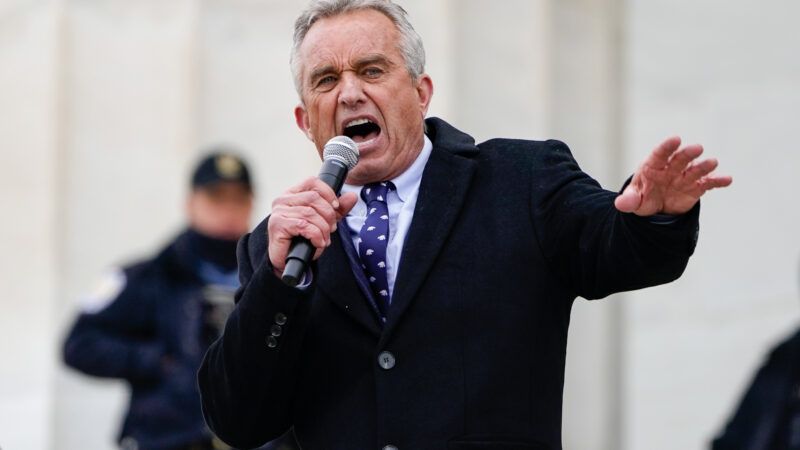Joe Biden More Vulnerable in 2024 Primary Than Donald Trump Ever Was in 2020
If Robert Kennedy Jr. and Marianne Williamson can draw nearly one-third of Democratic support, imagine how more conventional challengers would do.

The first two national polls of the declared 2024 Democratic presidential primary contest came out Thursday, and they already reveal an incumbent far more vulnerable to intraparty challenge than Donald Trump ever was in 2019–20.
Environmental/vaccine activist Robert F. Kennedy Jr., no doubt benefiting from unusually high name recognition, polled at 21 percent in an Emerson College survey and 19 percent in a Fox News poll—both higher figures than any Trump challenger received at any time during the last presidential cycle. Also eye-opening were the results for spiritual guru and 2020 primary also-ran Marianne Williamson: 8 percent and 9 percent, respectively, after never once polling higher than 2 percent in her first run.
The Emerson survey, which did not offer respondents the choices of "other," "not sure," or "none of the above," had Biden at 70 percent. Fox did include those categories (they received a combined 11 percent), and the president's support was down to 62 percent. The lowest poll number Trump ever registered against a declared 2020 primary opponent was 73 percent.
Biden's average of 66 percent vs. a combined 29 percent for his challengers compares unfavorably to Trump's average of 84 percent vs. an aggregate 7 percent for former Massachusetts Gov. Bill Weld, former Illinois congressman Joe Walsh, and former South Carolina Governor/congressman Mark Sanford, in the 2019 polls that included all three.
The comparative Kennedy/Williamson strength is all the more noteworthy considering that, unlike the group that Trump derided as "the three stooges," neither has held public office, let alone served as popular statewide officials. Both also belong to the unorthodox sliver of the Democratic spectrum, which is a lane that never attracted much interest in the party's 2020 primary, as voters were focused on finding the most marketable candidate to dislodge Donald Trump. Williamson, tech entrepreneur Andrew Yang, former congresswoman Tulsi Gabbard, and the late former Sen. Mike Gravel never combined for more than 4 percent in the polls during any given month last time around.
So what accounts for the iconoclasts' comparative popularity in 2023? For one, Biden demonstrably does not have the same hold on Democratic voters as Trump did as president among Republicans. In 2019–20, Trump's approval rating among GOP voters, as measured by Gallup, rested between 87 percent and 95 percent. Biden, whose latest overall approval rating was at a personal low of 37 percent, has over the past 12 months drawn Democratic approval at almost 10 points lower, between 78 percent and 87 percent.
Multiple polls in the run-up to primary season have shown pluralities and sometimes even majorities of Democrats saying they wish Biden wouldn't run for reelection, though home-team support for his candidacy has lately started to rise. As The Washington Post's Aaron Blake put it last week, the incumbent "is a guy whom only about half of Democrats want to run, half say is too old to serve, and only about 4 in 10 approve of strongly. Just 1 in 5 say they would be enthusiastic about his winning." Biden's newly announced campaign, Blake observed, "is without comparison in modern American political history. Never have we seen so few members of a president's party wanting him to seek reelection."
The whys of Biden's soft support seem obvious enough: Americans are deeply pessimistic about the economy; nearly three-quarters think the country is going in the wrong direction. It's been a lousy past three years. And the guy in charge of the federal government ain't getting any younger. If Republicans somehow manage to avoid doing the stupid thing of renominating a proven presidential loser, and if Trump manages to resist sabotaging whoever would get the GOP nod, then Biden's one main advantage—he has proven he can beat the 45th president—evaporates overnight.
It's possible that Democratic voters, after indulging in a brief fling with political competitors, no matter how weird, will rally back around the old incumbent. For the moment, most major party figures, led by power-thirsty California Gov. Gavin Newsom, are being good soldiers. But if the anti-establishment fringe continues to attract nearly one-third of Democratic polling support, or even increase on that, keep on the lookout for three potential responses: 1) The Biden campaign strong-arming ostensibly neutral party institutions; 2) the media opening up an all-out assault on the (very assaultable) record of RFK Jr., and 3) the more ambitious of establishmentarians beginning to quietly edge off the sidelines.
Through both voter disinterest and Trump/Republican National Committee chicanery, the 2020 GOP primary was a dud. Democrats, love 'em or hate 'em, seem much more interested in a real-life contest. Buckle up.


Show Comments (68)